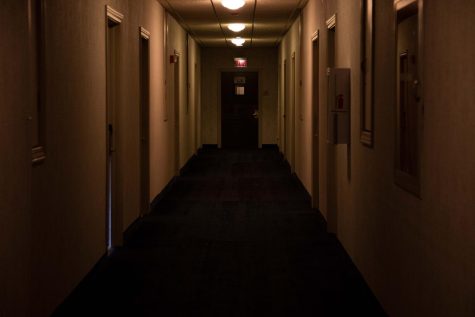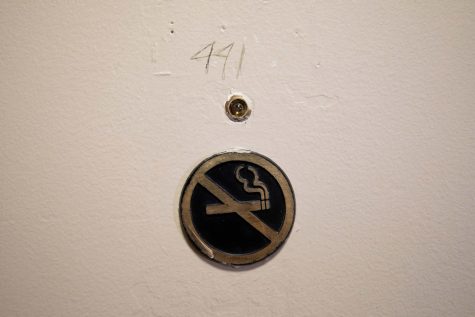Ghosts living in a downtown landmark: ‘If anywhere is haunted in Chicago, it’s the Congress Hotel’
July 1, 2022

Editor’s note: This article is from the Communication Department’s award-winning Echo magazine.
Whether they’re blood-drenched, transparent or floating in a swirl of white, ghosts loom over folklore, literature and movies. For real-life ghost hunter and Chicago Hauntings Ghost Tour guide Tony Szabelski, ghosts seep through the shadows, drift in and out of elevators and manipulate radio frequencies. The epicenter of Szabelski’s paranormal investigation is a skyline staple in glowing, neon red lettering: the Congress Plaza Hotel.
“If anywhere is haunted in Chicago, it’s the Congress Hotel,” Szabelski says. But why, if the hotel is thought to be a graveyard of tortured souls waiting patiently for their next victim, are the most haunted rooms always booked?
Built to accommodate visitors of the 1893 World’s Columbian Exposition, the hotel has a colorful history that includes serial killers, homicides, suicides, presidents and mafia activity. During the late 19th century, the tourist destination was home to horse-drawn carriages, cobblestone roads and flickering gas lights.
Celebrities and presidents alike have spent time at the Congress, including Grover Cleveland, Theodore Roosevelt and Franklin Delano Roosevelt. Szabelski says Al Capone visited the hotel around 1928, and there is lore of him roaming the halls as a fedora-clad apparition.
Chicago’s first serial killer, who went by the alias Henry H. Holmes, would linger in the Congress lobby, stalking young women and visitors of the World’s Fair, according to Szabelski. It is rumored that Holmes, who confessed to 27 murders and was sentenced to death in 1896, appears as a sheathed apparition, roaming the hotel’s hallways.
Of the plethora of spirits that are believed to dwell at the hotel, Szabelski believes one is the ghost of 6-year-old Karl Langer who died horrifically in 1939. After spending a beautiful August day at the Lincoln Park Zoo, Karl’s mother, Adele, flung him and his younger brother out of a 12th floor window, killing them both, before jumping out of the window herself.
Another alleged apparition, known as Peg Leg Johnny, is believed to play tricks on guests by turning electronics on and off. Although the ghost’s identity remains unknown to this day, Szabelski says that Peg Leg Johnny may have been a vagrant who was murdered in the back alley.
Alternatively, there is lore that he is the ghost of a killer clown named Charles Conway. Conway, a circus performer with a wooden leg, made national news in 1912 when he was convicted of murdering a heiress with a clown handkerchief. After making a grand escape from prison in 1925, Conway was never seen again, Szabelski says. Regardless of whether the phantom was once a murder victim or a killer clown, reported sightings of Peg Leg Johnny have spanned the dining room, lobby and hallways.
Szabelski notes that there have been far too many suicides at the Congress to keep track of — though some stories linger on — including that of Spanish-American War veteran Captain Louis Osteim, who killed himself on April 8, 1900, the night before his wedding. Leaving no suicide note behind, Osteim put a gun to his head and pulled the trigger. Szabelski believes that the cause of Osteim’s death was post traumatic stress disorder from his time in the war, which was then referred to as “night terrors.”
“A lot of people have reported a shadow figure, especially coming out of their closet,” Szabelski says, adding that sightings of what many believe to be Osteim’s ghost are recurring and have prompted guests to up and leave the hotel in the dead of night.

Security has also received frantic middle-of-the-night phone calls from guests who have seen a woman in room 411 standing next to their bed, coming out of the bathroom or yanking on their sheets, Szabelski says. Conner Gossel, a historian who studies paranormal occurrences, believes that room 411 in the south tower is the most haunted at the hotel.
“It’s one of those odd things that nobody ever thinks about, similar to cruise ships, how a lot of people just kind of go there to die and pass away and have somebody there to take care of them and dispose of them, as morbid and grotesque as it seems,” says Gossel. “So there’s a lot of unfortunate deaths. There’s a lot of deliberate murders. There’s a lot of planned passing-aways that have taken place in so many of the rooms [that lead to the hotel’s] energy being as charged as it is.”
A belief in the occult predates reading, writing and agriculture, says Tok Thompson, associate professor of anthropology and communications at the University of Southern California. Thompson teaches the university’s Ghost Stories course, which examines the portrayal of ghosts in literature, folklore and popular culture.
“To believe in ghosts, you [have to] believe in life after death, that there is something like a soul or a spirit,” Thompson says. “This is very often taken as a sort of confirmation of the idea of a spiritual reality, a spiritual essence to the individual. I think for many people, that’s a very comforting idea.”
Ghost stories tell elaborate tales of cursed Native American burial grounds, possessed former slaves in the South and the demonic spirits of those who have suffered gruesome murders. Ethical failures, Thompson says, are at the root of what haunts us.
“Ethics transcend the pragmatic and transcend the world of the living,” Thompson says. “There’s an idea built here, an ethical idea in ghost belief, in haunting ghosts, that you can’t really get away with evil. If you murder somebody and cover it up, you will still be haunted by that, and that can be on a personal level, and then it can also be on a societal level.”
Thompson divides apparitions into two categories: wanted ghosts or unwanted, friendly or unfriendly.
“We tend to really notice the other ones, these are problematic ghosts that haunt us,” Thompson says. “Why does a ghost haunt? And one thing we can say about that is that, if you look at a society, it’s a very interesting question to ask, ‘What is this society haunted by?’”
Those who have failed society and, simultaneously, those who have been failed by society, are presumed by ghost hunters and paranormal enthusiasts to come back from the dead, seeking revenge on the living. The collective guilt that manifests itself from our subconsciousness to our physical reality serves a purpose. Ghosts keep a piece of our history alive.
You can read the entire 2022 issue of Echo, as well as previous issues, on our website.







